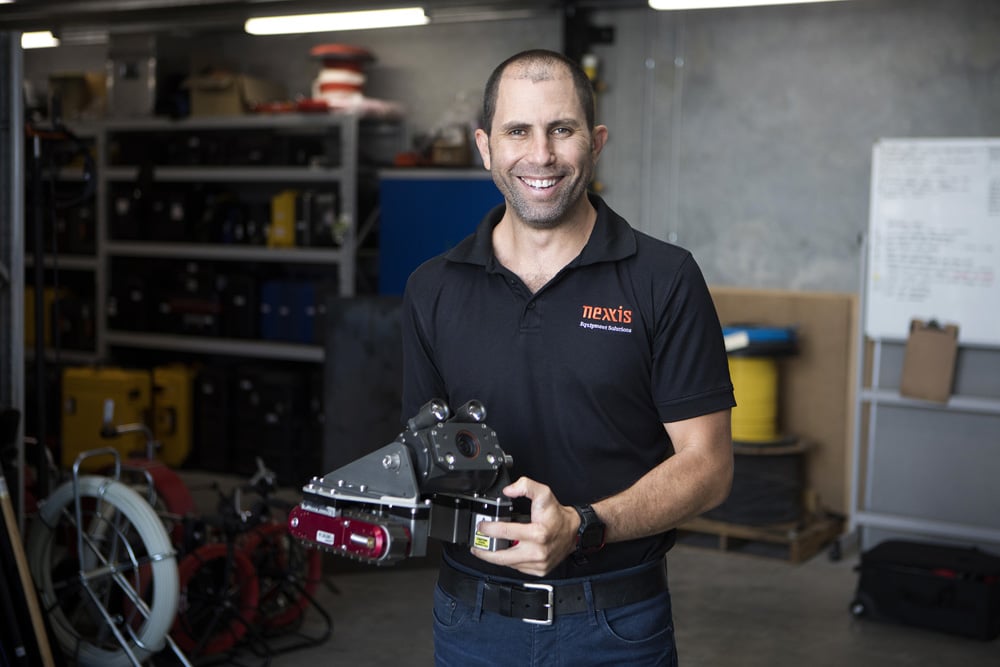Homegrown Talent Key to Services Success

Australia must act now to foster future talent in the engineering and technology space, according to the founder of a Perth-based mining services company which invents bespoke robots for major mine operators.
Nexxis founder and chief executive Jason De Silveira started the company in 2014 by renting out and servicing mining equipment from his home in Fremantle. Now he’s the head of a 7,000 sqm facility in O’Connor – and two sites in Texas and Singapore – that designs and manufactures in-house robotics specific for the mining industry.
One of Nexxis’ more successful solutions includes camera-mounted “crawlers” which can inspect tight spaces, such as pipes, to keep workers from harm’s way.
“The way that people used to inspect pipelines was by putting someone inside on a skateboard and running them down it,” De Silveira told Paydirt. “Some places still do it and that’s obviously frowned upon.
“Humans aren’t designed to go in there. You put a hole in there and then expect someone to climb in and think it’s safe. You’re also relying on the person to go in and give you a thumbs up on the situation. Is it a big thumbs up or a small thumbs up?
“That’s where data is really important. Using robotics is about making it safer but also letting humans make better decisions. That’s something we’re good at. What humans aren’t good at is doing mundane tasks we don’t want to do like going into a vessel in 45-degree heat.”
De Silveira attributes his company’s success to hiring locally and investing into upskilling employees. But, the entrepreneur warns Australia is falling behind in tech and software expertise in comparison to industries like Silicon Valley.
“There is a big push on sovereign capabilities but we don’t have enough software engineers. Something is not working right at the moment, something is not clicking,” he said. “Right now, talent goes to Silicon Valley or the US because that’s where the opportunities are and what we need to do is invest in retaining that.”
Recognising this, De Silveira and his team started a training programme called Lab61 two years ago.
“In order to influence change, you have to go right down to grassroots,” he said. “We’re all fighting from the same pool of people in the end. “So, we run robotics academies at Lab61 from years 5-8 and offer work experience for years 10-12. We also have undergraduate and graduate placement programmes. “We initially built Lab61 for ourselves because it was taking so long to train people that come into our business, but then we made it external to give back to the community.”
Lab61 offers introductory courses and more advanced classes covering repair and maintenance, simulation software and robot competency testing.
Given the industry’s current state, De Silveira faces moments of labour constraint and technology’s place in the mining industry isn’t slowing down.
“I’m bringing a software engineer from overseas under a visa because I can’t find one right now,” he said. “We’re not a tech state or country in certain areas, so how do we attract the right people? This change in demand happened very quickly.” Uptake in data collection – through the means of robotics, automation and software – has been a major game-changer for improving efficiency and mitigating risks in the mining industry.
The collision of technology with traditional mining services like drilling and transport has paved the way for the likes of automated haulage and low-emission electrified fleets.
De Silveira believes the changing nature of technology’s role in the resources industry should encourage Australian companies to invest in their staff for the long term.
“The industry works on a contractor based model, which means hire somebody today and if they’re not good, just find somebody else,” he said. “How do you transition a workforce when you don’t value their training?
“A company like ours has to think about a five-year plan and invest in people. During COVID-19, we didn’t let anybody go. The No.1 reason for that was based on the fact that knowledge and people are absolutely paramount in our organisation. “If you value that, then it’s not just, ‘I’ve got 50,000 procedures that I can just hire someone in and they do it’, it’s the culture of how we work, it’s the innovative way of thinking, it’s the way that we design, the ability to work as a team and building knowledge over time. That’s what makes us different and the business offering unique.”
Despite all of the strides Nexxis has made, De Silveira still believes there is more growth yet to come.
“Our current aspiration is continuing to get the right people and culture into the business and get our technology and products to market, which I think would be good for Australia,” he said. “We’re still a very young company. We’ve got all the jigsaw pieces together; we’ve just got to get them really functioning well and that will get our growth moving in the right direction.”
– Fraser Palamara, Paydirt Magazine
Contact us to find out more about our range of robots or any of our other inspection products, or request a quote online.
Carry on reading How Robots Are Shaking up NDT Inspections to find out more.
Nexxis has been featured in the latest Paydirt Magazine. The article is extracted above.

